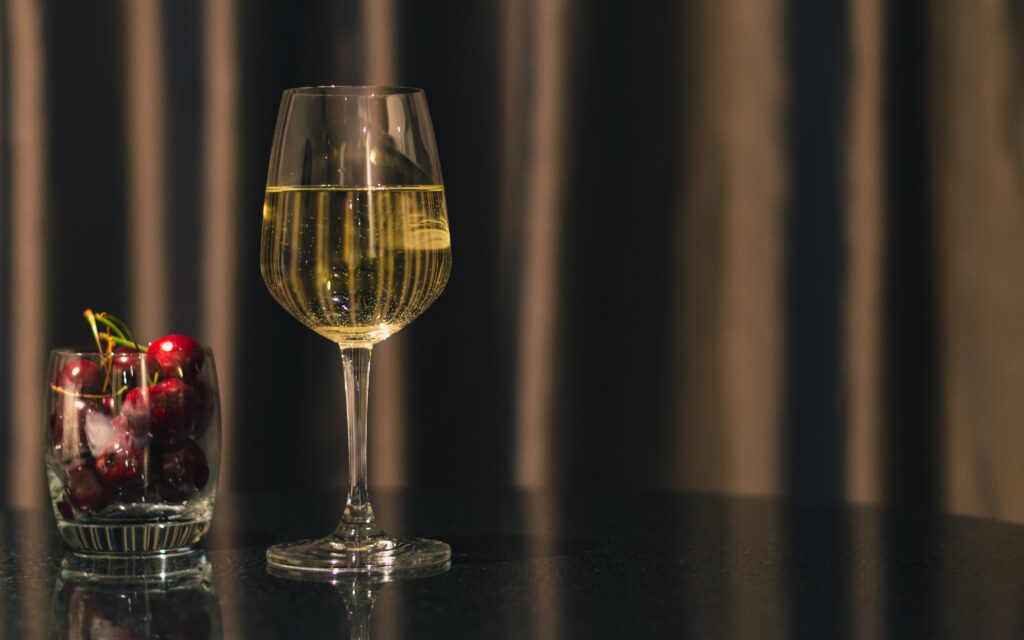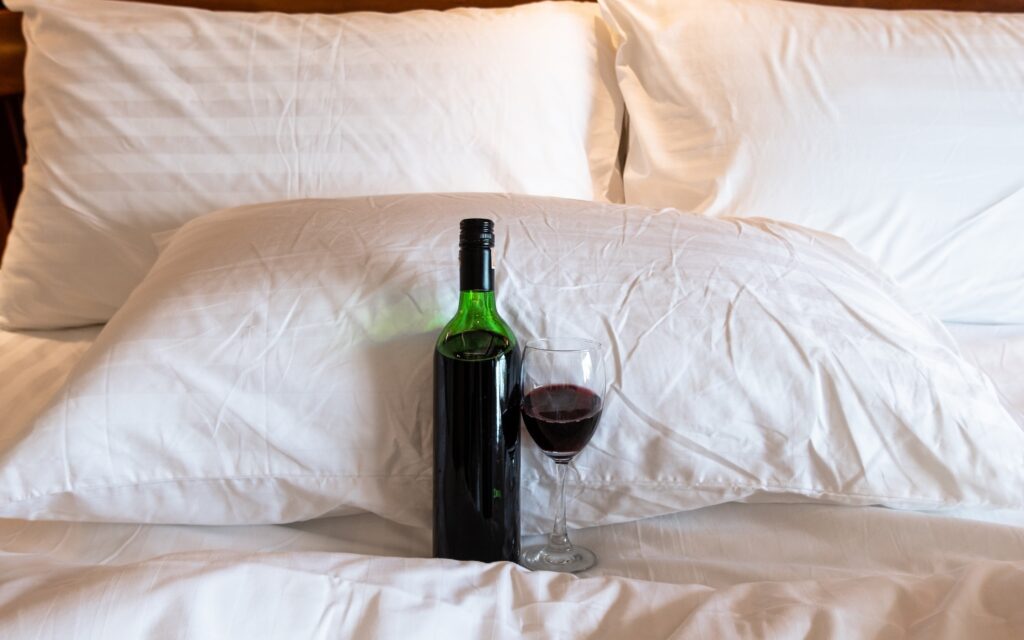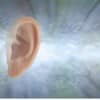Why does wine make me sleepy? If you’ve ever asked this question, you’ll know how easy it is to find yourself starting to snooze after a couple of glasses of red on a cozy night in.
So, today, we’re going to be looking at why wine makes you sleepy, and whether it’s more likely to have a sedative effect than any other drink.
As a depressant, any kind of alcohol can make you feel sleepy, but some people swear wine is more likely to affect them than other drinks.
Maybe it’s something about the soothing rich flavors – or perhaps the fact many wines have a higher alcohol percentage than the average pint of beer.
Does drinking wine make you sleepy?
First, it’s worth noting the connection between alcohol and sleep in the first place. One of the most significant side effects of drinking alcohol is somnolence – the desire to sleep. This is why it’s so common for many people to consider drinking before bed if they can’t drift off.
Unfortunately, alcohol’s sedative effects aren’t as great as you might think. Alcohol’s effect on the central nervous system is complicated. While it does make you feel sleepy at first, it can also harm the quality of your sleep, and make it more likely you’ll wake up during the night.
So, why does wine make you sleep?
When you have a drink, it takes around twenty minutes for the alcohol in the drink to absorb into your blood stream. From there, the small size of the alcohol molecules means they can easily pass through the brain-blood barrier. Here they start targeting GABA-A receptors, accelerating neural processes, which make you feel drowsy.
However, this is a fact relevant to all alcohol – not just wine.
Studies into why wine in particular is so effective at making you feel sleepy are still ongoing. One report published in 2017 found many people feel different after drinking different kinds of alcohol.
This report found people drinking red wine were most likely to have the lowest “energy” levels and the highest feelings of fatigue. 60% of people said they felt tired after drinking wine.
Why does red wine make me sleepy?
Since there are different kinds of wine, it’s worth looking at the two more common forms available, and how they differ. Let’s start with red wine.
Red wine is the drink most commonly associated with sleepiness or drowsiness. There are a few reasons scientists believe red wine could make you feel sleepy.
For instance, experts in Italy say they’ve discovered many of the grapes picked to make popular red wines contain higher levels of the sleep hormone, melatonin.
This hormone is commonly used in supplemental form to assist with sleep, and it’s naturally created in the body to assist with the circadian rhythm.
Grapes featuring melatonin in their skin include those used for Cabernet Sauvignon, Merlot, and many other popular dinks.
Red wine grapes are also picked later than white wine grapes, which give them a higher alcohol content, due to a higher level of sugar. The more sugar in the grape, the more the grapes can ferment into alcohol.
When winemakers create their red wine with red grapes, they also keep the skins on, which is where the majority of the melatonin comes from. Red grapes are also higher in tannins, which can also contribute to feelings of sleepiness.
Simply put, red wines make you feel sleepier than white wines because they have higher levels of alcohol content, more melatonin, and more sedative capabilities. Plus, many people find the warm flavors very relaxing.

Why does white wine make me sleepy?
White wine blends are more acidic, have a lower alcohol level per volume, and generally don’t include as many tannins or melatonin. White grapes mature more quickly than reds, which mean there are lower levels of sugar in white wines too.
While both kinds of grapes can include melatonin – the substance responsible for encouraging sleep, white wine grapes have a lower amount than grapes used for red wine.
It’s also worth noting wine manufacturers often separate the grapes in white wine from their skins, when making the drink. This separation prevents any melatonin in grape skins from saturating the wine.
If white wine makes you feel drowsy, the chances are it’s the impact of the alcohol rather than the specific drink itself.
Of course, if your wine has special ingredients, this could also contribute to your feelings of drowsiness. Some companies are even experimenting with CBD wine.
Why does wine make me sleepy but not liquor?
Wine offers a combination of ingredients which contribute to your feelings of sleepiness after a drink. Red wine, in particular, is a sleep-inducing substance featuring high levels of melatonin, higher alcohol contents, and a stronger concentration of tannins.
Many red wines also have warm and spicy flavors, more likely to make us feel cosy and ready for bed. In many Scandinavian countries red wine is even served warm in winter.
You’re more likely to want a snooze after drinking something warm than if you were to drink something crisp, light, and refreshing, like a vodka with a chaser.
All alcohols can influence how sleepy you feel, but some are more likely to have an impact on your your tiredness levels than others. For instance, it’s less common to feel tired after having a drink of vodka and lemonade, because you’re also getting a high dose of sugar with your alcohol.
The sugars and syrups mixed into various liquors can have the same effect, making you feel more alert to counteract the impact of the alcohol.
If you’re concerned about a drink making you feel too sleepy, it’s probably best to stay away from red wine and consider something with a lower alcohol content and a higher amount of sugar.
Drinking plenty of water in-between drinks can help too, as it helps to reduce the alcohol concentration in your system.

Wine makes me tired: What can I do?
If wine makes you sleepy, and you want to avoid this side effect, you can always switch red wine with something more refreshing, like a white wine or rose.
If you’re committed to drinking red wines, you could consider following a few tips, like:
Eating before you drink
Eating before you drink any alcohol will help to reduce the rate at which the body absorbs the substance. This should lower the impact of the alcohol on your mental state. This doesn’t mean you can eat a huge meal and drink anything you want. However, a healthy serving of food before a drink can be a good idea.
Hydrate frequently
Another great way to make sure you’re not going to get knocked out by your drink is to get as much water into your system as possible. We often feel tired when we’re dehydrated – which is why you feel so much better after your first glass of water each morning.
Alcohol is a diuretic, which means it forces your body to remove liquids quickly, making you dehydrated. Replacing the lost liquid in your body with regular water top-ups is a great way to keep yourself feeling energetic.
Pace yourself
Drinking wine shouldn’t be a hectic and chaotic experience. Generally, it’s something people do because they like to savour the unique flavors. With this in mind try not to drink too much at once. You don’t need to keep up with your friends – particularly if they’re drinking beverages with a lower alcohol percentage. Take your time and pause between drinks for a glass of water when necessary.
How do you stop wine making you sleepy?
Stopping wine from making you sleepy isn’t easy. Alcohol in any form will have an impact on how alert you’re going to feel. Fortunately, you can reduce your risk of feeling too exhausted by being prepared.
Make sure you stick to white wine if you can to avoid feeling tired after a drink. If you’re going to be drinking red wine, drink plenty of water and eat regularly too.
When the time comes to go to sleep, remember any alcohol can disrupt your sleep pattern. Drink plenty of water before bed to stay hydrated.
Siestio. Sleep Matters.
General advice disclaimer
This article contains general tips and advice. However, no diet or exercise program should be started without consulting your physician or other industry professional first. For more information read our full disclaimer here.







